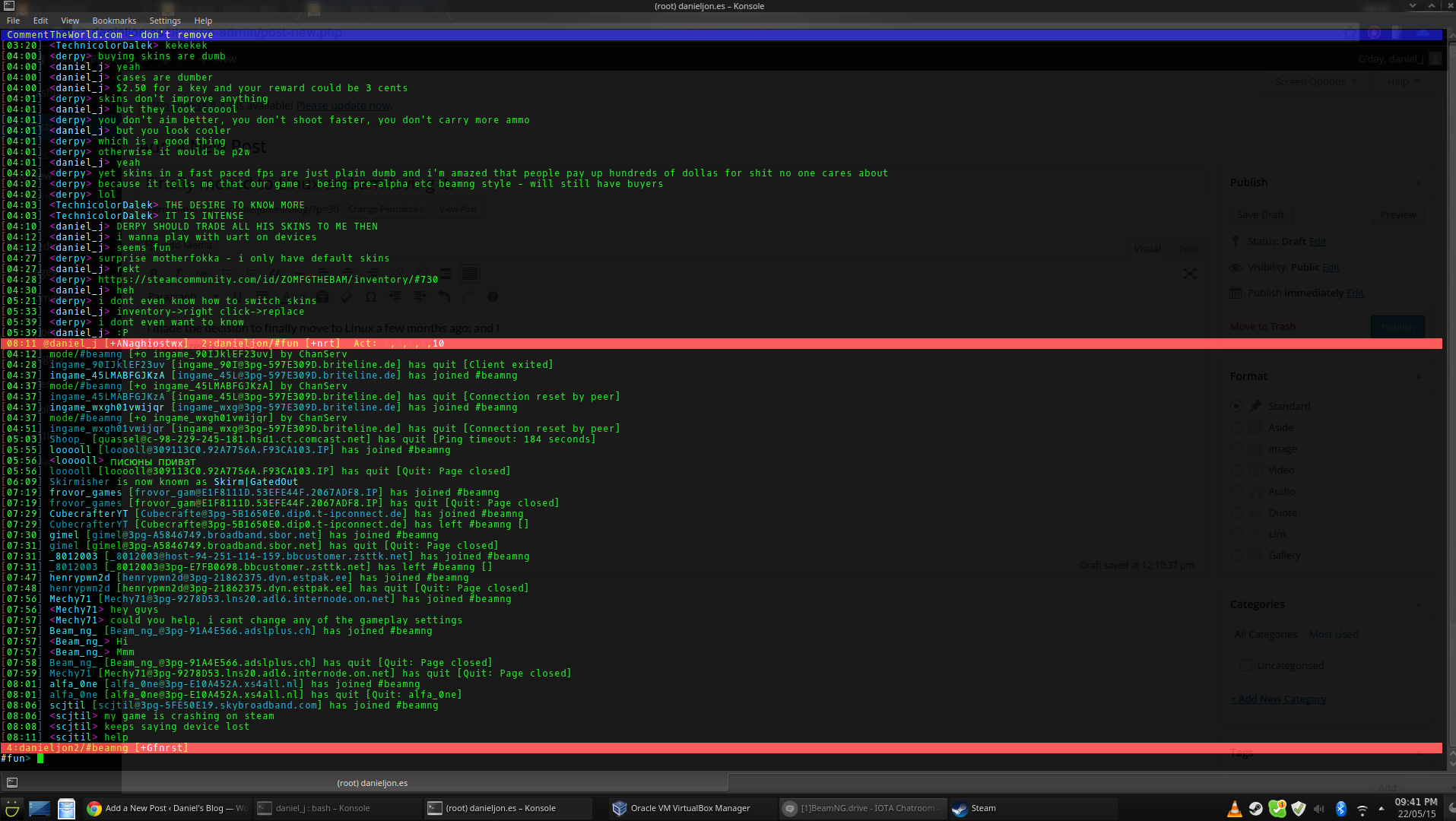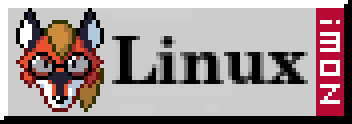

Been on Windows playing Fallout 4 - ashamed.
1/12/2015
But, i'm now back home doing what I love.
A new theme face lift, fancy background images and home security camera setup. Perfect.
Current work space - split over 2 1920*1080 monitors.

I'm currently working on my RGB lighting program - more precisely, I'm working on the micro-controller side of things - fun!
So much for """"daily"""" media/posts.
You can always find me on my IRC server - http://danieljon.es:9090/?channels=#fun - I kick anyone that doesn't identify themselves.
Or, contact me via Email at: admin@danieljon.es


Game engines and OpenGL
6/10/2015
Lately I've been teaching myself OpenGL in C using GLUT, literally as low level and annoying as you can get.
Just today I've been playing with an engine known as 'Irrlicht'. It is an OpenGL C++ API for OpenGL.
At the moment i'm just simply loading meshes and maps from Quake, I hope soon to get a shooting game of sorts going, but that is quite a while away.
You can download a video of my current progress here


Langton's Ant
20/9/2015
Inspired by https://www.youtube.com/watch?v=NWBToaXK5T0 I've decided to embark on creating my own version of this simulation using Qt/C++.
Yet another boring weekend.
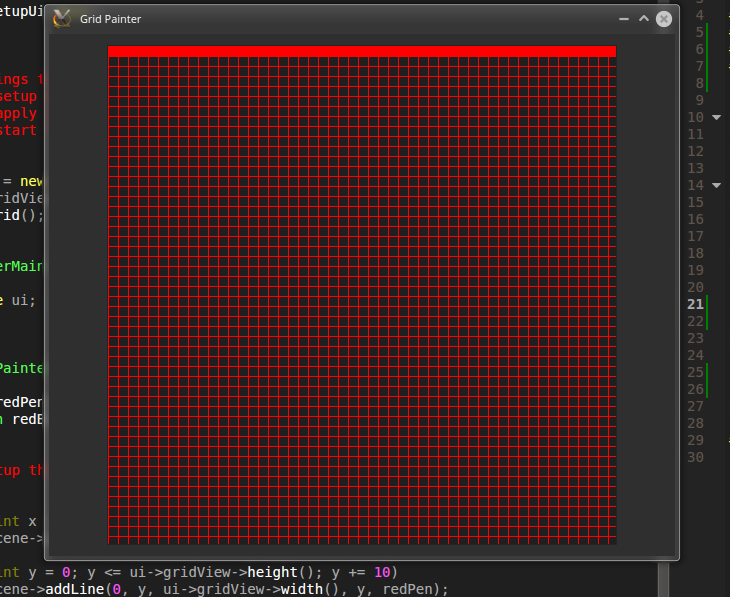
Woo, I have a grid drawn, amazing.
2d graphics suck.


Card hand generator
17/8/2015
When not flicking them i'm randomly generating them, because why not.
It is written in C and is able to be compiled on any UNIX/Windows environment.
example use:
./CardsGrid hand 5
this generates a completely random hand of 5 cards. (seeded with the current time)
the code for this mini-project can be found here http://pastebin.com/1KyJBEB6


Front panel PC device
12/6/2015
Recently I've been working on a front PC panel device.
Seeing as there are plenty of unused slots I've designed and created a display panel containing a 16*2 LCD display and a small OLED screen.
They are powered by an Arduino with the data coming from an application made in C++/Qt communicating via a serial connection via USB. Currently it can play a few songs through a piezo buzzer, and just for fun, I created a simple flappy birds clone.
The arduino has an internal controller made up of 3 buttons; however for external interaction I have added an infra-red reciever; this allows me to control the entire project with an IR controller - I have chosen and programmed my RGB LED controller -any controller can easily be added.
The arduino is currently sitting inside my PC and the mounting for the screens are ugly. But it isn't done; I plan to make it look better and add features such as CPU/RAM etc monitoring with graphs and a weather display.
Here is an image of the current application controlling the Arduino:
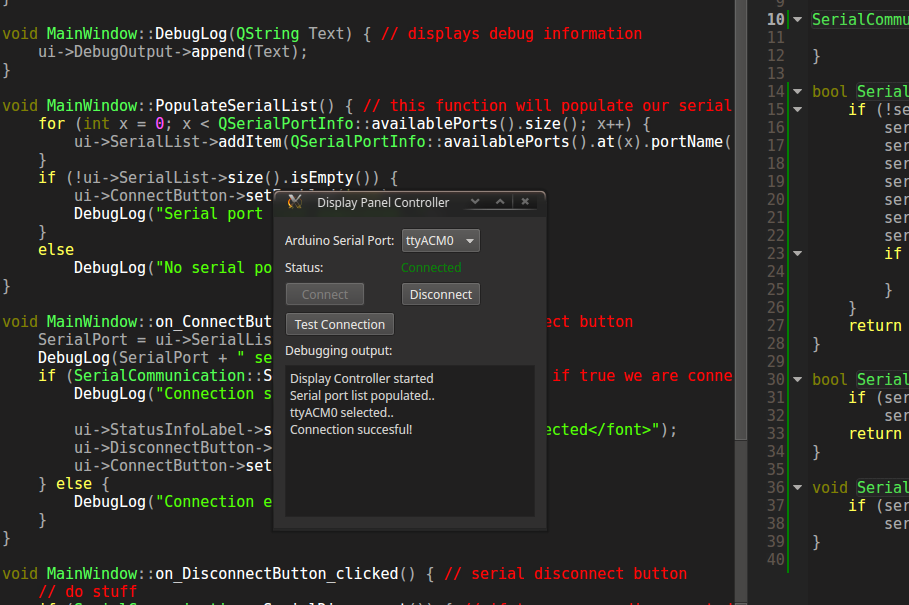
And here is a horrible image of the display (shitty webcam):
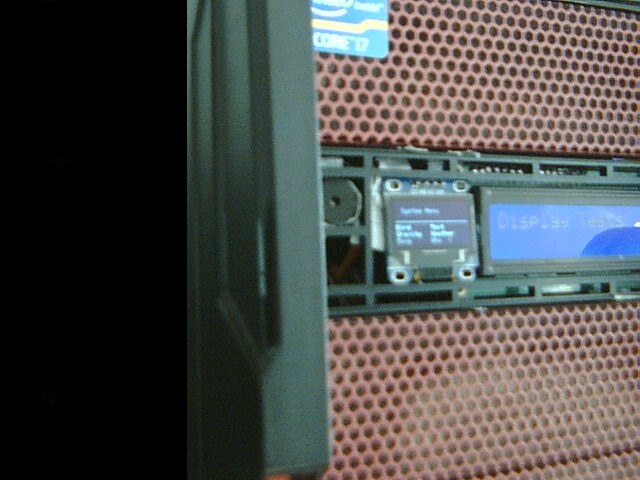
I'll repost any updates made.
update:
Have done some major work to the UIs back end.
It downloads a weeks worth of data for your location and stores it all etc.
Also allowed the user to display custom text on either screen, makes your computer look more personal.
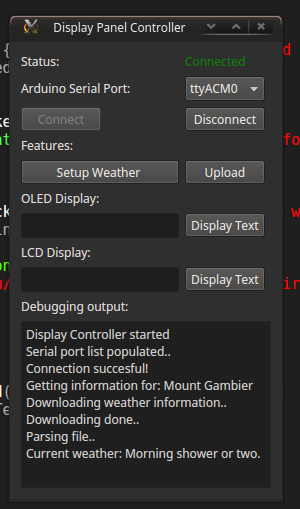
I've now published the code on GitHub and will update it regularly.
https://github.com/daniel-Jones/PC-Panel-Display

Services I run
5/6/2015
I've realised that I run quite a few things on my server, some useful, most not:
IRC (Internet Relay Chat) Server:
I run this server for myself and a few people to hang out in a free setting - http://irc.danieljon.es:6667
QWEBIRC - Online IRC Client (connects to my server):
I run this service to allow people without IRC client to connect to my server (derp* sucks) - http://danieljon.es:9090/
ZNC - IRC Bouncer:
This is a private bouncer using the ZNC software package, this allow myself and a few others to connect to multiple IRC servers using a fancy reverse DNS host (currently relaxing.in.the.stars.because-of.science)
IRSSI - IRC client:
IRSSI is a text based IRC client I run on my server inside a screen session.
Image Hosting Service:
I created an image hosting service from scratch because I figured it would be useful for assisting people with issues in #BeamNG, it turned out to just be a cool project for myself and others to use - http://upload.awful.pictures
Custom User Software:
I've also integrated the image hosting service with a register/login system custom made using PHP and MySQL, this allows you to register to services (I currently have a "Draw something" game made and a file uploading service) that are not available to the public. The database has critical information MD5 hashed with a custom salt accompanying it - your password is completely safe. - http://danieljon.es/login/
Blog:
You're here right now; I point all my domains here - http://danieljon.es
Domains:
I currently own and maintain one server with 3 domains:
danieljon.es - main domain used for most things - if you didn't notice it is my name, Daniel Jones - I bet you don't have your name as a domain
awful.pictures - I use this domain for my image hosting service
because-of.science - my server has a reverse DNS record that points here - it makes me look sup3r l33t in IRC.
Email server:
I currently have an email server setup - instead of using Gmail and having a something@gmail.com address I have something@danieljon.es - My main account admin@danieljon.es - this is where you can easily reach me (or IRC of course)
I will probably host a lot more in the future, but currently, this is all I need.

Simple server in C++/Qt
5/6/2015
I've been using sockets lately for serial communication between C++/Qt and my arduino. I figured I may as well try out a TCP server using sockets. It's quick and dirty, but pretty cool and holds many possibilities for projects. I connect via telnet in a running bash terminal - it doesn't actually do anything other than connect and communicate with each other.
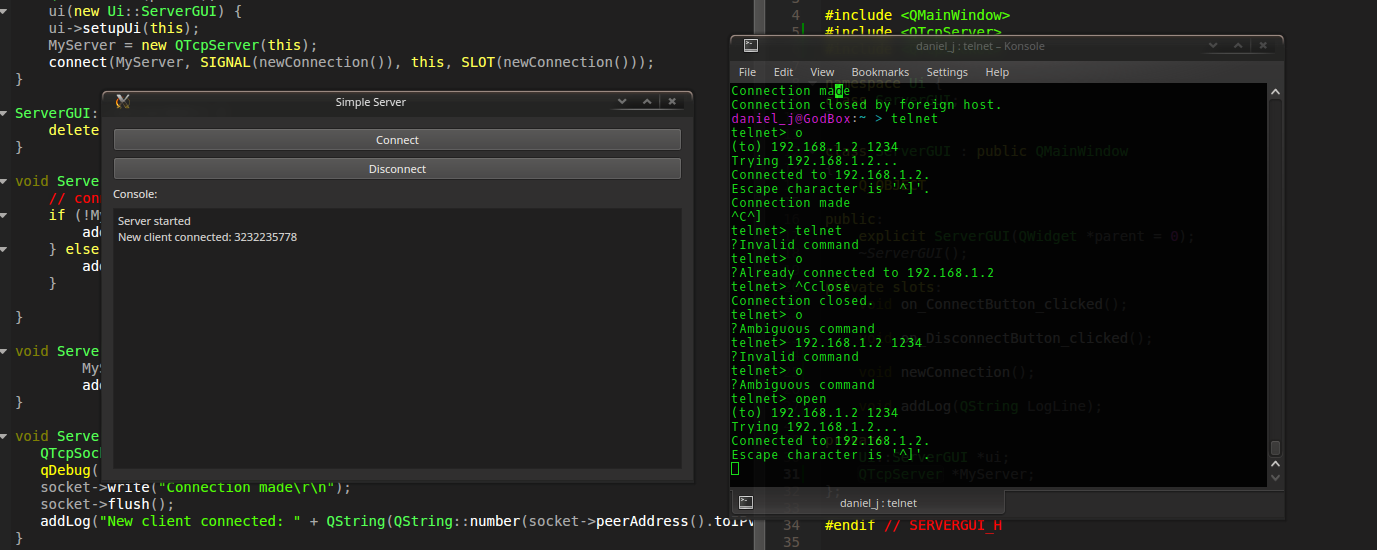

Phone SIM cards are easily exploitable and overly intrusive
27/5/2015
The life of an individual in 2015 is vastly different to that of other decades in the fact that everyone is lazy in some way or form; whether it be for work related purposes, or easy access to your social media accounts we all have a mobile phone that contains a piece of technology that is easily exploitable (taking advantage of software/hardware bugs/issues) and overly intrusive. Within our mobile phones, whether it be a smart phone or not, we have all conveniently placed an extraordinarily powerful and smart device that can allow a hacker to take complete control of your phone, a SIM card. A SIM (subscriber identity module) card1 is a piece of technology that everybody knows exists, yet hardly anyone can define what it actually does or how it works, they just know you need one to get onto Facebook; believe it or not the humble SIM card in your phone is a fully fledged computer and can host and run applications without your phone, thus yourself ever knowing. The alarming facts do not however end there; your phone, whether it be a 2005 flip phone, or the latest product from Apple with finger print identification to stop hackers allows your telecommunication providers, or in the worrying case, a hacker to run applications on your SIM card potentially allowing them to spy on your GSM2 traffic which includes your phone calls, SMS messages and Internet usage.
An eye opening speech3 by Karl Koscher and Eric Butler performed at Defcon 214 (an American based hacking conference) displayed, for the first time, the power and pure horror of what a SIM card is intentionally capable of doing when in the hands of a hacker. A single generic SIM card has the power similar to that of a basic Arduino5, with an alarmingly larger range of nefarious uses. These pieces of hardware contain an 8-bit AVR (micro controller, similar to a computers central processing unit), 256KB of ROM (program memory), 72KB of non-volatile (doesn't require power to store any data) EEPROM (flash based storage, this is where the SIM cards programming is stored), 6KB of RAM and operate at 20-30 MHz. These specifications, to anyone that has knowledge around computers and hardware are, to put it simply, astonishing; the possibilities of these devices are endless, and I can not exactly fathom how and why they have not yet been exploited on a large scale - as far as we know. As explained by Karl and Eric to modify and flash (upload your own code) a SIM card you need physical access to your victims card, along with some easily obtainable hardware to communicate with the card. However the flash based storage on most newer SIM cards can not be modified - so how can these devices be hacked in present day 2015? They explained that you must start from the beginning. Karl and Eric purchased blank SIM cards and flashed their own code onto them and gave them out to willing citizens who amazingly accepted free SIM cards, this was of-course a proof of concept operation and any recorded data was destroyed.
Unknown to many a programming language known as Java6 is found within most everyday pieces of hardware we take advantage of, especially those that have one main function such as a DVD player or the computer that controls the ice in a modern day refrigerator. A SIM card is no exception; these pieces of hardware run a variation of Java known as 'Java Card7'. This programming language creates applets (the final compiled version of your code) that leave a small memory footprint; perfect for the specifications of a SIM card. Oracle, the current owners of this software have released a free SDK8 (software development kit) to those of whom are interested in developing applets - this in theory is great for those of whom are interested in the technology and do not have the funds to purchase licences; it however allows malicious hackers to develop their own firmware for SIM cards that are intended to be distributed for free. SIM cards are given permission by the end users mobile phone to run applications both on the SIM card and devices background without the consent of the owner - this however is not an exploit or mistake; this is how GSM phones are designed and you are expected to have a legitimate SIM card. Early mobile phones are considered 'non-smart', this means only one thread/process can be run at any given time - think back to playing Snake on an old Samsung dot matrix phone, you are about to beat your personal high score when somebody calls you; your game is closed and score is lost. Due to a phone then being only single threaded your SIM card was important for processing incoming data such as phone calls and SMS messages, which would then alert your phone - this required a high level of permission and trust; sadly the technology and single-threaded 'mind-set' is still around today, even in modern day 'smart phones'. Try it for yourself; if you own an iPhone locate the menu item: settings->phone->SIM applications, if you are using an Android phone head to your application list and select the item "SIM toolkit" - these are applications that are currently installed on your SIM card and are running without your knowledge or permission. Having a malicious SIM card inserted into your phone will allow a hacker to run their own applets and intercept any incoming GSM data. Once you have an exploited card there is nothing that can be done with the exception of getting a new card - do not accept SIM cards from anyone unless they are behind a cash register and chewing gum; but you can not really trust them either.
The story of the exploitable SIM card will however not come to an end any time soon; they are simply too convenient to swap and replace and work exceptionally. Even with the chillingly confronting information provided, you as the audience will not cease to use the seemingly humble SIM card and ironically I myself will not either: we are the problem and the solution, we must want things to change before they actually will. However lets be honest, who actually cares about the alarming state of SIM card hacking, our service providers do not as the technology has not changed since the mid 1990's, you probably wont tonight or tomorrow either - by the way, I have a few spare SIM cards with free unlimited data plans, would you like one?
1http://www.imore.com/what-is-sim-card
2http://studenttravel.about.com/od/globalcommunication/a/stayconnected_3.htm
3https://www.youtube.com/watch?v=31D94QOo2gY
4https://www.defcon.org/
5http://en.wikipedia.org/wiki/Arduino
6http://java.com/en/

CS:GO cross hair generator
25/5/2015
Recently I've been playing a lot of the game Counter Strike:GO.
This is a game that requires precise aim; and with aim comes a cross hair.
I was influenced by an on-line CS:GO cross hair generator (http://tools.dathost.net/) and decided to create my own.
I've got the basics sorted, I just need to work on the rendering of the on screen preview.
I'm using the Qt framework and C++ for this project.
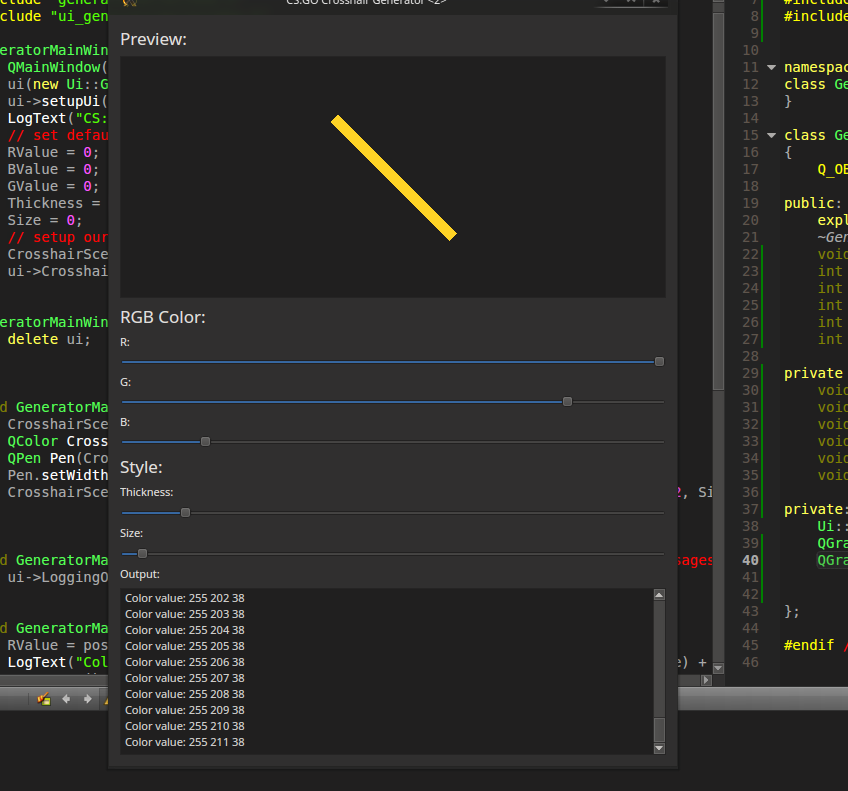
I hope to actually follow through with this project and complete it.
Stay tuned!
edit: I ended up stopping at this point
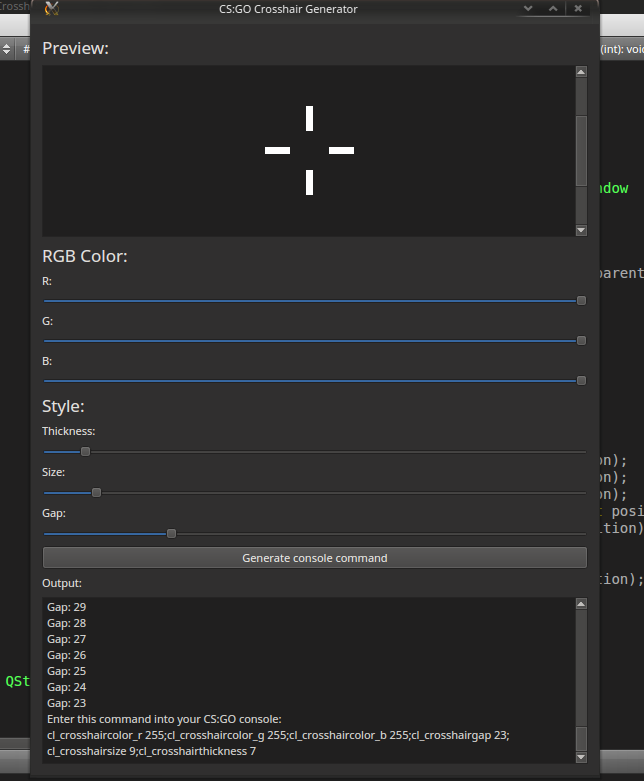

Finally moved to GNU/Linux and am loving it.
22/5/2015
I made the decision to finally move to GNU/Linux a few months ago; and I haven't regretted it once.
I'm using Linux Mint 17.1 with KDE.
This is a current capture of my main monitor (I currently run dual 1920*1080 monitors). It'll be interesting to see what it looks like in a year and if I'm still using GNU/Linux.
